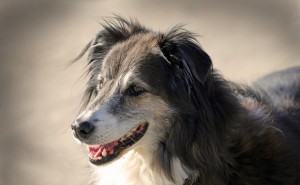Irish Fairy Story
CHAPTER I
 There are people who do not like dogs a bit-and in this story there is a man who did not like dogs. In fact, he hated them. When he saw one he used to go black in the face, and he threw rocks at it until it got out of sight. But the Power that protects all creatures had put a squint into this man’s eye, so that he always threw crooked.
There are people who do not like dogs a bit-and in this story there is a man who did not like dogs. In fact, he hated them. When he saw one he used to go black in the face, and he threw rocks at it until it got out of sight. But the Power that protects all creatures had put a squint into this man’s eye, so that he always threw crooked.
This gentleman’s name was Fergus Fionnliath, and his stronghold was near the harbour of Galway. Whenever a dog barked he would leap out of his seat, and he would throw everything that he owned out of the window in the direction of the bark. He gave prizes to servants who disliked dogs, and when he heard that a man had drowned a litter of pups he used to visit that person and try to marry his daughter.
Now Fionn, the son of Uail, was the reverse of Fergus Fionnliath in this matter, for he delighted in dogs, and he knew everything about them from the setting of the first little white tooth to the rocking of the last long yellow one. He knew the affections and antipathies which are proper in a dog; the degree of obedience to which dogs may be trained without losing their honourable qualities or becoming servile and suspicious; he knew the hopes that animate them, the apprehensions which tingle in their blood, and all that is to be demanded from, or forgiven in, a paw, an ear, a nose, an eye, or a tooth; and he understood these things because he loved dogs, for it is by love alone that we understand anything.
Among the three hundred dogs which Fionn owned there were two to whom he gave an especial tenderness, and who were his daily and nightly companions. These two were Bran and Sceo’lan, but if a person were to guess for twenty years he would not find out why Fionn loved these two dogs and why he would never be separated from them.
Fionn’s mother, Muirne, went to wide Allen of Leinster to visit her son, and she brought her young sister Tuiren with her. The mother and aunt of the great captain were well treated among the Fianna, first, because they were parents to Fionn, and second, because they were beautiful and noble women.
No words can describe how delightful Muirne was–she took the branch;and as to Tuiren, a man could not look at her without becoming angry or dejected. Her face was fresh as a spring morning; her voice more cheerful than the cuckoo calling from the branch that is highest in the hedge; and her form swayed like a reed and flowed like a river, so that each person thought she would surely flow to him.
Men who had wives of their own grew moody and downcast because they could not hope to marry her, while the bachelors of the Fianna stared at each other with truculent, bloodshot eyes, and then they gazed on Tuiren so gently that she may have imagined she was being beamed on by the mild eyes of the dawn.
It was to an Ulster gentleman, Iollan Eachtach, that she gave her love, and this chief stated his rights and qualities and asked for her in marriage.
Now Fionn did not dislike the man of Ulster, but either he did not know them well or else he knew them too well, for he made a curious stipulation before consenting to the marriage. He bound Iollan to return the lady if there should be occasion to think her unhappy, and Iollan agreed to do so. The sureties to this bargain were Caelte mac Ronan, Goll mac Morna, and Lugaidh. Lugaidh himself gave the bride away, but it was not a pleasant ceremony for him, because he also was in love with the lady, and he would have preferred keeping her to giving her away. When she had gone he made a poem about her, beginning:
“There is no more light in the sky–”
And hundreds of sad people learned the poem by heart.
Now, if you want to read the rest of this story, which includes a slighted fairy love, the use of magic, revenge and redemption, then you can find it (text only) here.